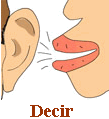The
gerund expresses an action that it is happening.
|
GERUNDIO
|
|
ar
|
|
er
|
|
ir
|
- andoHablar
 Hablando
Hablando
Andar
 Andando
Andando
|
|
- iendoComer
 Comiendo
Comiendo
Querer
 Queriendo
Queriendo
|
|
- iendoVivir
 Viviendo
Viviendo
Salir
 Saliendo
Saliendo
|
- Voy al trabajo andando.
- Estoy comiendo fruta.
- Estoy viviendo en Valencia.
 (vowel
+ iendo) = yendo
(vowel
+ iendo) = yendo
- Oír
 Oyendo / Caer
Oyendo / Caer
 Cayendo
Cayendo
- ¿Puedes oír la música?
- Sí. Estoy oyendo a Mozart.

 Verbs
which end in -ir and have an
-e in the preceding sylable, change the vowel to
-i
Verbs
which end in -ir and have an
-e in the preceding sylable, change the vowel to
-i
 Verbs
which end in -ir and have an
-o in the preceding sylable, change the vowel to
-u
Verbs
which end in -ir and have an
-o in the preceding sylable, change the vowel to
-u
-
Decir
 Diciendo (
Diciendo ( deciendo ) /
- Dormir
 Durmiendo (
Durmiendo ( dormiendo )
 When
forming the gerund, the main verb is often accompanied by
the verb 'estar'.
When
forming the gerund, the main verb is often accompanied by
the verb 'estar'.
- Juan
está durmiendo. - Juan is sleeping.
- Nosotros estamos oyendo la música. - We are listening to
music.